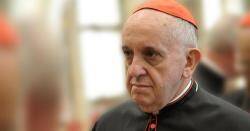Here's a surprise. From Vatican Radio: "The archbishop of Havana, Cardinal Jaime Lucas Ortega y Alamino, on Saturday read from a document given him by Pope Francis, outlining the speech he gave during the pre-conclave General Congregation meetings of the Cardinals. Cardinal Ortega had been so impressed with the speech he asked the then-Cardinal Jorge Bergoglio for a copy of the intervention. Cardinal Ortega received permission from Pope Francis to share the information." These speeches are traditionally seen as a cardinal's "program" for the future of the church and this one, from what I understand, heavily influenced the conclave's decision on the next pope. That Pope Francis has authorized its release means that he sees this as a fair summation of his thoughts on the church. Note the especially strong term "theological narcissism." It reads in part:
When the Church does not come out of herself to evangelize, she becomes self-referential and then gets sick. (cf. The deformed woman of the Gospel). The evils that, over time, happen in ecclesial institutions have their root in self-referentiality and a kind of theological narcissism. In Revelation, Jesus says that he is at the door and knocks. Obviously, the text refers to his knocking from the outside in order to enter but I think about the times in which Jesus knocks from within so that we will let him come out. The self-referential Church keeps Jesus Christ within herself and does not let him out.
Here's the entire (brief) summary of Cardinal Bergoglio's "intervention," as these talks are called.








